2025年中考英语人教版二轮复习语法专项突破讲义:专题9 动词的时态
文档属性
| 名称 | 2025年中考英语人教版二轮复习语法专项突破讲义:专题9 动词的时态 |
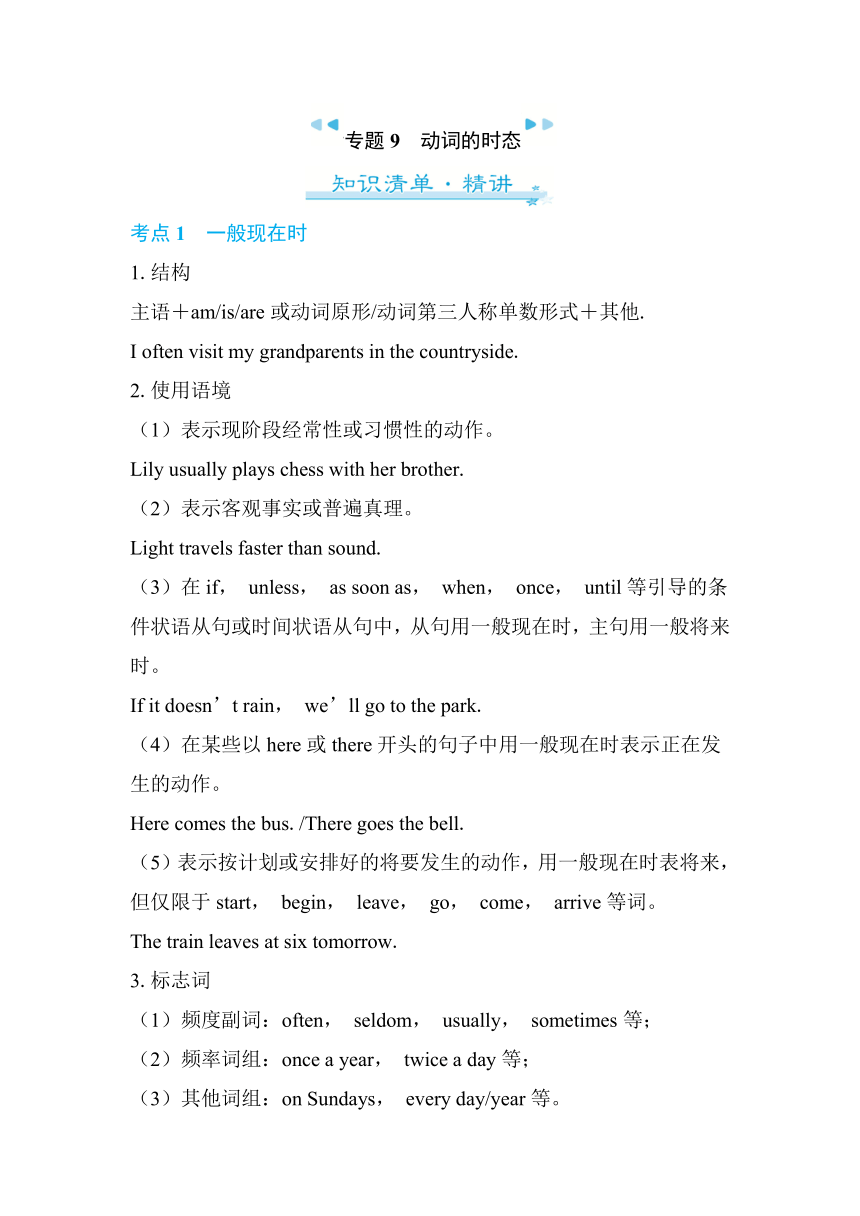
|
|
| 格式 | docx | ||
| 文件大小 | 96.4KB | ||
| 资源类型 | 教案 | ||
| 版本资源 | 人教新目标(Go for it)版 | ||
| 科目 | 英语 | ||
| 更新时间 | 2024-12-12 10:28:23 | ||
图片预览

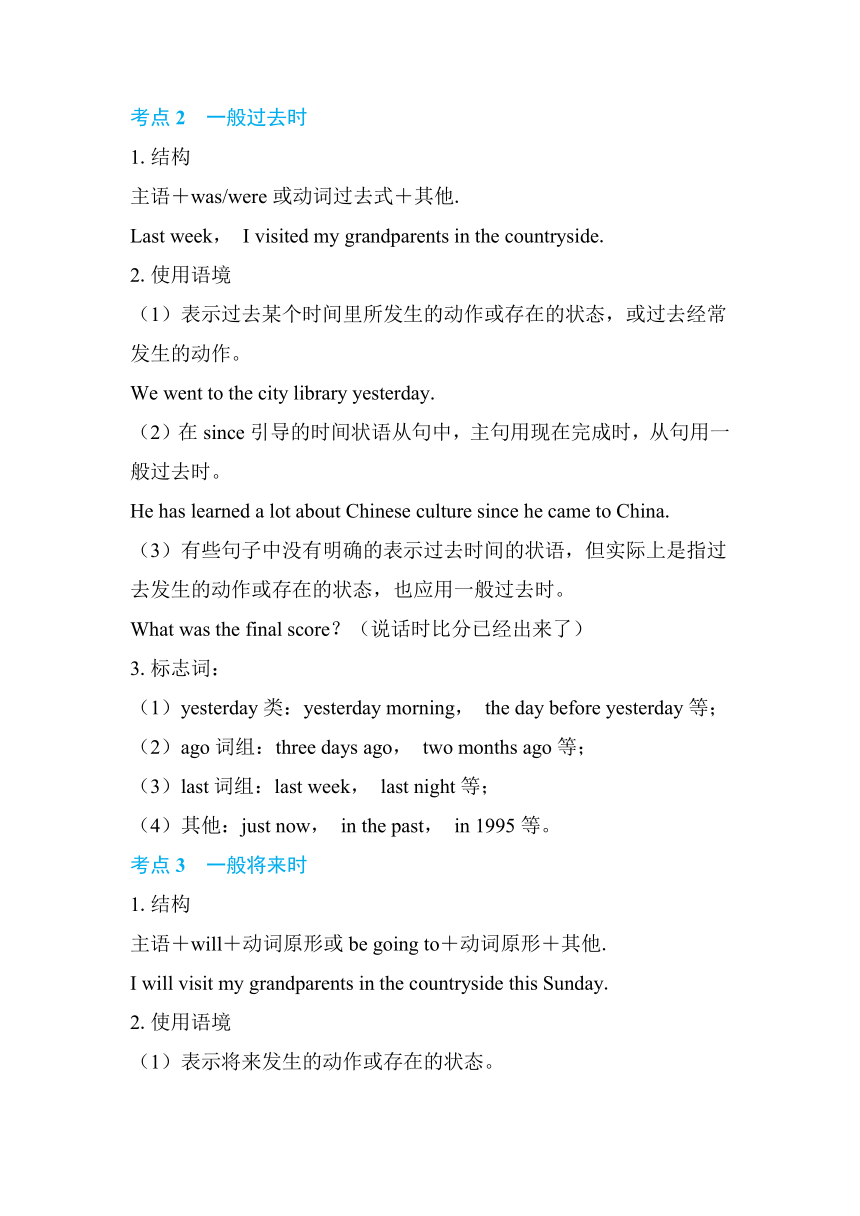
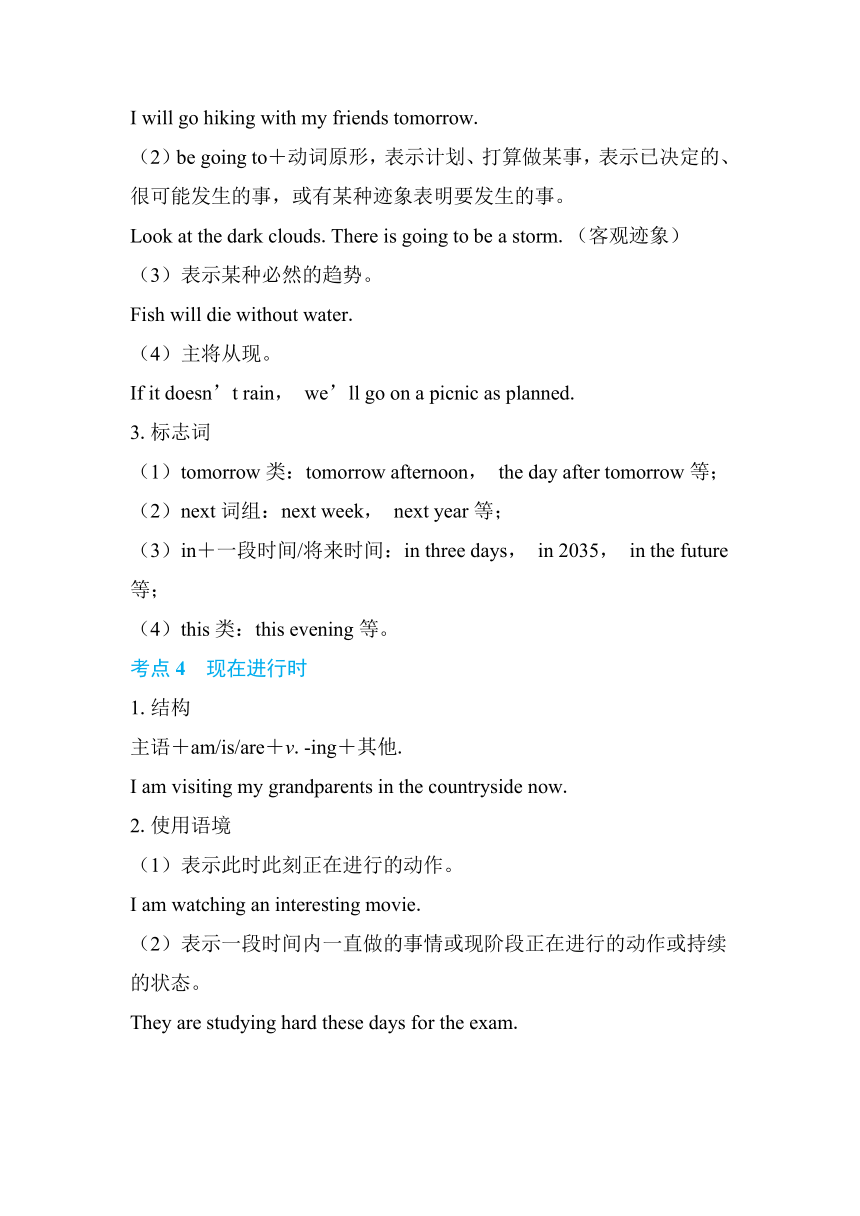
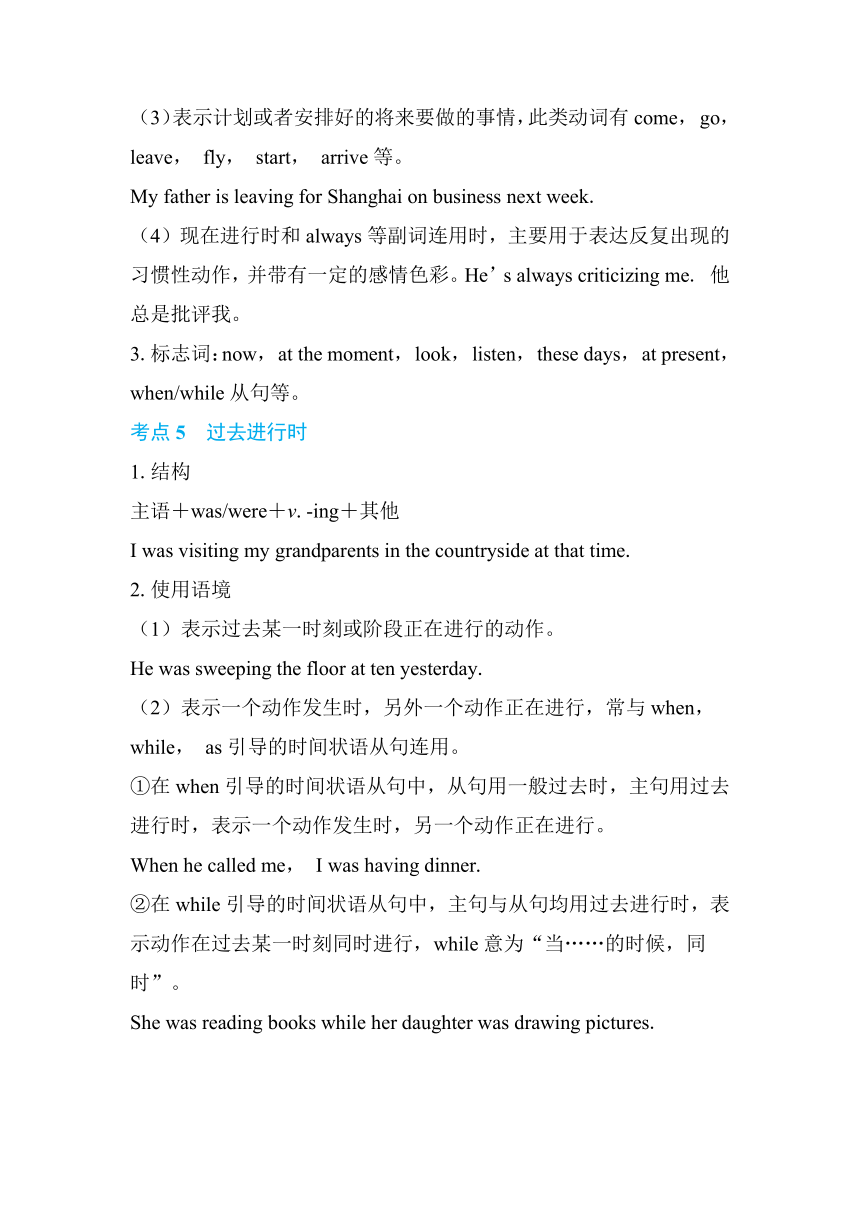
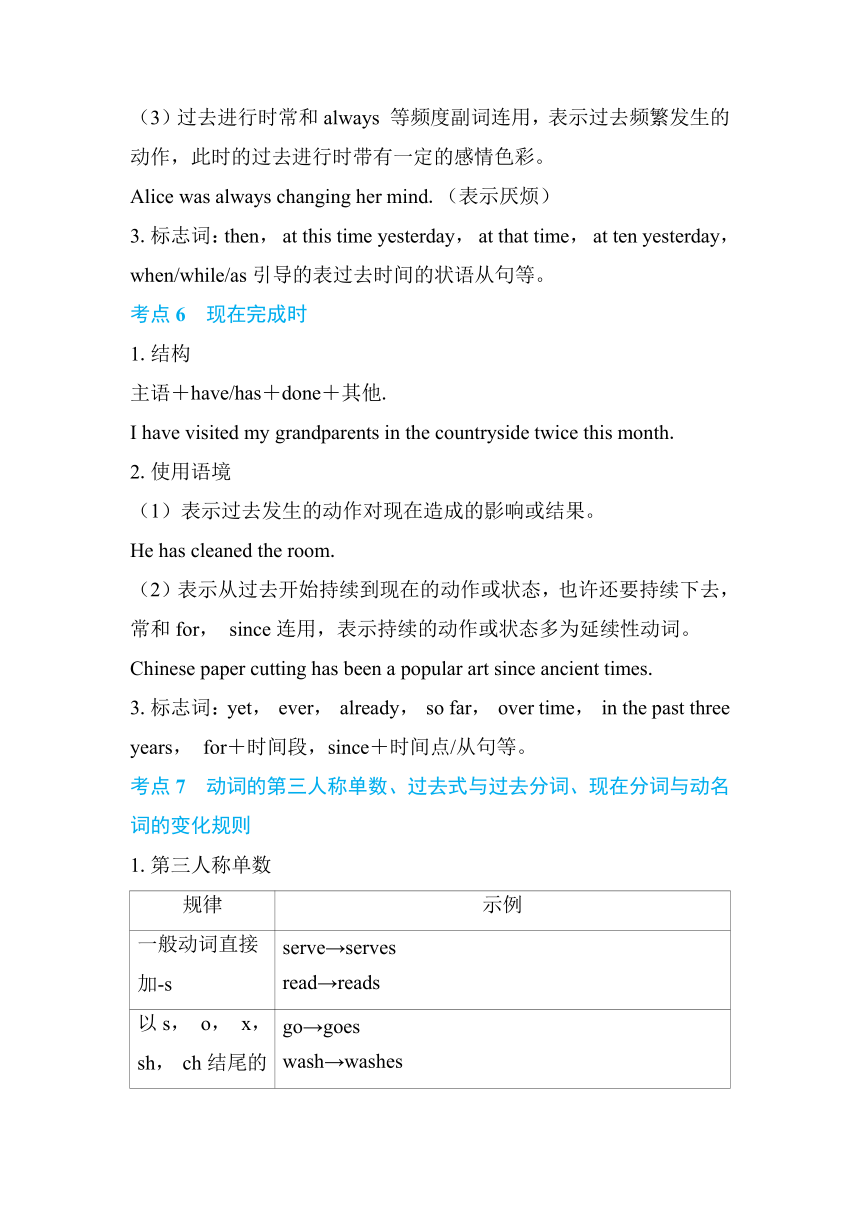
文档简介
专题9 动词的时态
考点1 一般现在时
1.结构
主语+am/is/are或动词原形/动词第三人称单数形式+其他.
I often visit my grandparents in the countryside.
2.使用语境
(1)表示现阶段经常性或习惯性的动作。
Lily usually plays chess with her brother.
(2)表示客观事实或普遍真理。
Light travels faster than sound.
(3)在if, unless, as soon as, when, once, until等引导的条件状语从句或时间状语从句中,从句用一般现在时,主句用一般将来时。
If it doesn’t rain, we’ll go to the park.
(4)在某些以here或there开头的句子中用一般现在时表示正在发生的动作。
Here comes the bus./There goes the bell.
(5)表示按计划或安排好的将要发生的动作,用一般现在时表将来,但仅限于start, begin, leave, go, come, arrive等词。
The train leaves at six tomorrow.
3.标志词
(1)频度副词:often, seldom, usually, sometimes等;
(2)频率词组:once a year, twice a day等;
(3)其他词组:on Sundays, every day/year等。
考点2 一般过去时
1.结构
主语+was/were或动词过去式+其他.
Last week, I visited my grandparents in the countryside.
2.使用语境
(1)表示过去某个时间里所发生的动作或存在的状态,或过去经常发生的动作。
We went to the city library yesterday.
(2)在since引导的时间状语从句中,主句用现在完成时,从句用一般过去时。
He has learned a lot about Chinese culture since he came to China.
(3)有些句子中没有明确的表示过去时间的状语,但实际上是指过去发生的动作或存在的状态,也应用一般过去时。
What was the final score?(说话时比分已经出来了)
3.标志词:
(1)yesterday类:yesterday morning, the day before yesterday等;
(2)ago词组:three days ago, two months ago等;
(3)last词组:last week, last night等;
(4)其他:just now, in the past, in 1995等。
考点3 一般将来时
1.结构
主语+will+动词原形或be going to+动词原形+其他.
I will visit my grandparents in the countryside this Sunday.
2.使用语境
(1)表示将来发生的动作或存在的状态。
I will go hiking with my friends tomorrow.
(2)be going to+动词原形,表示计划、打算做某事,表示已决定的、很可能发生的事,或有某种迹象表明要发生的事。
Look at the dark clouds.There is going to be a storm.(客观迹象)
(3)表示某种必然的趋势。
Fish will die without water.
(4)主将从现。
If it doesn’t rain, we’ll go on a picnic as planned.
3.标志词
(1)tomorrow类:tomorrow afternoon, the day after tomorrow等;
(2)next词组:next week, next year等;
(3)in+一段时间/将来时间:in three days, in 2035, in the future等;
(4)this类:this evening等。
考点4 现在进行时
1.结构
主语+am/is/are+v.-ing+其他.
I am visiting my grandparents in the countryside now.
2.使用语境
(1)表示此时此刻正在进行的动作。
I am watching an interesting movie.
(2)表示一段时间内一直做的事情或现阶段正在进行的动作或持续的状态。
They are studying hard these days for the exam.
(3)表示计划或者安排好的将来要做的事情,此类动词有come, go, leave, fly, start, arrive等。
My father is leaving for Shanghai on business next week.
(4)现在进行时和always等副词连用时,主要用于表达反复出现的习惯性动作,并带有一定的感彩。He’s always criticizing me. 他总是批评我。
3.标志词:now, at the moment, look, listen, these days, at present, when/while从句等。
考点5 过去进行时
1.结构
主语+was/were+v.-ing+其他
I was visiting my grandparents in the countryside at that time.
2.使用语境
(1)表示过去某一时刻或阶段正在进行的动作。
He was sweeping the floor at ten yesterday.
(2)表示一个动作发生时,另外一个动作正在进行,常与when, while, as引导的时间状语从句连用。
①在when引导的时间状语从句中,从句用一般过去时,主句用过去进行时,表示一个动作发生时,另一个动作正在进行。
When he called me, I was having dinner.
②在while引导的时间状语从句中,主句与从句均用过去进行时,表示动作在过去某一时刻同时进行,while意为“当……的时候,同时”。
She was reading books while her daughter was drawing pictures.
(3)过去进行时常和always 等频度副词连用,表示过去频繁发生的动作,此时的过去进行时带有一定的感彩。
Alice was always changing her mind.(表示厌烦)
3.标志词:then, at this time yesterday, at that time, at ten yesterday, when/while/as引导的表过去时间的状语从句等。
考点6 现在完成时
1.结构
主语+have/has+done+其他.
I have visited my grandparents in the countryside twice this month.
2.使用语境
(1)表示过去发生的动作对现在造成的影响或结果。
He has cleaned the room.
(2)表示从过去开始持续到现在的动作或状态,也许还要持续下去,常和for, since连用,表示持续的动作或状态多为延续性动词。
Chinese paper cutting has been a popular art since ancient times.
3.标志词:yet, ever, already, so far, over time, in the past three years, for+时间段,since+时间点/从句等。
考点7 动词的第三人称单数、过去式与过去分词、现在分词与动名词的变化规则
1.第三人称单数
规律 示例
一般动词直接加-s serve→serves read→reads
以s, o, x, sh, ch结尾的动词,加-es go→goes wash→washes
以辅音字母加y结尾的动词,应将y变为i,再加-es fly→flies study→studies
2.过去式与过去分词
规律 示例
一般动词直接加-ed work→worked stay→stayed
以不发音的字母e结尾的动词,只加-d like→liked
规律 示例
以辅音字母加y结尾的动词,应将y变为i,再加-ed study→studied carry→carried
以重读闭音节结尾且末尾只有一个辅音字母的动词,双写此辅音字母,再加-ed stop→stopped plan→planned
3.现在分词与动名词
规律 示例
一般动词直接加-ing sleep→sleeping wait→waiting
以不发音的字母e结尾的动词去e,再加-ing smile→smiling write→writing
以重读闭音节结尾且末尾只有一个辅音字母的动词,双写此辅音字母,再加-ing sit→sitting dig→digging plan→planning
少数以ie结尾的动词,变ie为y,再加-ing die→dying lie→lying
用括号内所给单词的适当形式填空。
1.—Congratulations! Can you share your secret to learning?
—If you work hard enough, you will succeed (succeed) in achieving your goal.
2.I have driven (drive) for thirty years, and I’m not going to stop now.
3.Eric is a sports fan and always follows (follow) the latest sports news.
4.—Sorry, I can’t hear you clearly. I am watching (watch) a football match.
—OK. I’ll ring you up later.
5.So far, the “Village Basketball Association” at Taipan village in Guizhou has got/gotten (get) tons of attention.
6.Nanjing Road is very crowded these days because the workers are repairing (repair) it.
7.—Tina, I called you just now but nobody answered.
—Oh, I was taking (take) a shower.
8.I have been (be) a teacher for forty years, but I have never met a boy like Tony.
9.I have written this in the hope that one day you will find (find) it.
10.In the past two years, Sun Jiarui has learned/learnt (learn) a lot of home cooking.
11.I was driving (drive) on the road when my car suddenly stopped.
12.While the others were picking strawberries, I had a rest. Before we returned (return), I put a lot of grass in my basket and then I put a few strawberries on the top.
13.I haven’t finished (finish) my work yet, so I can’t go for a walk with you.
14.The spirit of ox(牛) is playing/plays (play) an important role in China’s development this year.
15.I was just thinking (think) about a question and didn’t hear what you had said.
16.—I was taking (take) a shower when you called me at 8:00 last night.
—No wonder you didn’t pick it up.
17.Paper Shoot works (work) just like any other camera.
18.A journey of a thousand li begins (begin) with a single step.
19.Robert has spent (spend) three days preparing for his match.
20.If this goes (go) on, the wild animals will soon have nowhere to live.
21.If Kate finishes (finish) her homework, her parents will allow her to hang out with friends.
22.Shake the bottle well so that the milk mixes/will mix (mix) with the tea.
23.Excuse me, what problems are we really trying (try) to solve?
24.Kate is sitting (sit) alone while her kids at a nearby table are chatting happily.
25.Now Chinese people are living a happy life. Don’t be surprised if a Chinese person you have just met on a train invites (invite) you for a meal.
26.Tom visited (visit) the British Museum every month when he was in London.
27.Although his parents didn’t want him to work abroad, Li Yang stuck (stick) to his own decision.
28.There will be (be) at least six underground lines in Wuxi in five years’ time.
29.Millions of young people fought (fight) in World War Ⅱ so we could live in peace.
30.There was (be) a lot of rain outside last night.
31.I was watching TV while my parents were chatting (chat) on WeChat.
32.Fan Jinshi has done (do) a lot to protect Dunhuang culture for many years.
33.My teacher has taught (teach) me how to treat older people with respect in the past few years.
34.Jack finally fell (fall) asleep when the wind was dying down at midnight.
考点1 一般现在时
1.结构
主语+am/is/are或动词原形/动词第三人称单数形式+其他.
I often visit my grandparents in the countryside.
2.使用语境
(1)表示现阶段经常性或习惯性的动作。
Lily usually plays chess with her brother.
(2)表示客观事实或普遍真理。
Light travels faster than sound.
(3)在if, unless, as soon as, when, once, until等引导的条件状语从句或时间状语从句中,从句用一般现在时,主句用一般将来时。
If it doesn’t rain, we’ll go to the park.
(4)在某些以here或there开头的句子中用一般现在时表示正在发生的动作。
Here comes the bus./There goes the bell.
(5)表示按计划或安排好的将要发生的动作,用一般现在时表将来,但仅限于start, begin, leave, go, come, arrive等词。
The train leaves at six tomorrow.
3.标志词
(1)频度副词:often, seldom, usually, sometimes等;
(2)频率词组:once a year, twice a day等;
(3)其他词组:on Sundays, every day/year等。
考点2 一般过去时
1.结构
主语+was/were或动词过去式+其他.
Last week, I visited my grandparents in the countryside.
2.使用语境
(1)表示过去某个时间里所发生的动作或存在的状态,或过去经常发生的动作。
We went to the city library yesterday.
(2)在since引导的时间状语从句中,主句用现在完成时,从句用一般过去时。
He has learned a lot about Chinese culture since he came to China.
(3)有些句子中没有明确的表示过去时间的状语,但实际上是指过去发生的动作或存在的状态,也应用一般过去时。
What was the final score?(说话时比分已经出来了)
3.标志词:
(1)yesterday类:yesterday morning, the day before yesterday等;
(2)ago词组:three days ago, two months ago等;
(3)last词组:last week, last night等;
(4)其他:just now, in the past, in 1995等。
考点3 一般将来时
1.结构
主语+will+动词原形或be going to+动词原形+其他.
I will visit my grandparents in the countryside this Sunday.
2.使用语境
(1)表示将来发生的动作或存在的状态。
I will go hiking with my friends tomorrow.
(2)be going to+动词原形,表示计划、打算做某事,表示已决定的、很可能发生的事,或有某种迹象表明要发生的事。
Look at the dark clouds.There is going to be a storm.(客观迹象)
(3)表示某种必然的趋势。
Fish will die without water.
(4)主将从现。
If it doesn’t rain, we’ll go on a picnic as planned.
3.标志词
(1)tomorrow类:tomorrow afternoon, the day after tomorrow等;
(2)next词组:next week, next year等;
(3)in+一段时间/将来时间:in three days, in 2035, in the future等;
(4)this类:this evening等。
考点4 现在进行时
1.结构
主语+am/is/are+v.-ing+其他.
I am visiting my grandparents in the countryside now.
2.使用语境
(1)表示此时此刻正在进行的动作。
I am watching an interesting movie.
(2)表示一段时间内一直做的事情或现阶段正在进行的动作或持续的状态。
They are studying hard these days for the exam.
(3)表示计划或者安排好的将来要做的事情,此类动词有come, go, leave, fly, start, arrive等。
My father is leaving for Shanghai on business next week.
(4)现在进行时和always等副词连用时,主要用于表达反复出现的习惯性动作,并带有一定的感彩。He’s always criticizing me. 他总是批评我。
3.标志词:now, at the moment, look, listen, these days, at present, when/while从句等。
考点5 过去进行时
1.结构
主语+was/were+v.-ing+其他
I was visiting my grandparents in the countryside at that time.
2.使用语境
(1)表示过去某一时刻或阶段正在进行的动作。
He was sweeping the floor at ten yesterday.
(2)表示一个动作发生时,另外一个动作正在进行,常与when, while, as引导的时间状语从句连用。
①在when引导的时间状语从句中,从句用一般过去时,主句用过去进行时,表示一个动作发生时,另一个动作正在进行。
When he called me, I was having dinner.
②在while引导的时间状语从句中,主句与从句均用过去进行时,表示动作在过去某一时刻同时进行,while意为“当……的时候,同时”。
She was reading books while her daughter was drawing pictures.
(3)过去进行时常和always 等频度副词连用,表示过去频繁发生的动作,此时的过去进行时带有一定的感彩。
Alice was always changing her mind.(表示厌烦)
3.标志词:then, at this time yesterday, at that time, at ten yesterday, when/while/as引导的表过去时间的状语从句等。
考点6 现在完成时
1.结构
主语+have/has+done+其他.
I have visited my grandparents in the countryside twice this month.
2.使用语境
(1)表示过去发生的动作对现在造成的影响或结果。
He has cleaned the room.
(2)表示从过去开始持续到现在的动作或状态,也许还要持续下去,常和for, since连用,表示持续的动作或状态多为延续性动词。
Chinese paper cutting has been a popular art since ancient times.
3.标志词:yet, ever, already, so far, over time, in the past three years, for+时间段,since+时间点/从句等。
考点7 动词的第三人称单数、过去式与过去分词、现在分词与动名词的变化规则
1.第三人称单数
规律 示例
一般动词直接加-s serve→serves read→reads
以s, o, x, sh, ch结尾的动词,加-es go→goes wash→washes
以辅音字母加y结尾的动词,应将y变为i,再加-es fly→flies study→studies
2.过去式与过去分词
规律 示例
一般动词直接加-ed work→worked stay→stayed
以不发音的字母e结尾的动词,只加-d like→liked
规律 示例
以辅音字母加y结尾的动词,应将y变为i,再加-ed study→studied carry→carried
以重读闭音节结尾且末尾只有一个辅音字母的动词,双写此辅音字母,再加-ed stop→stopped plan→planned
3.现在分词与动名词
规律 示例
一般动词直接加-ing sleep→sleeping wait→waiting
以不发音的字母e结尾的动词去e,再加-ing smile→smiling write→writing
以重读闭音节结尾且末尾只有一个辅音字母的动词,双写此辅音字母,再加-ing sit→sitting dig→digging plan→planning
少数以ie结尾的动词,变ie为y,再加-ing die→dying lie→lying
用括号内所给单词的适当形式填空。
1.—Congratulations! Can you share your secret to learning?
—If you work hard enough, you will succeed (succeed) in achieving your goal.
2.I have driven (drive) for thirty years, and I’m not going to stop now.
3.Eric is a sports fan and always follows (follow) the latest sports news.
4.—Sorry, I can’t hear you clearly. I am watching (watch) a football match.
—OK. I’ll ring you up later.
5.So far, the “Village Basketball Association” at Taipan village in Guizhou has got/gotten (get) tons of attention.
6.Nanjing Road is very crowded these days because the workers are repairing (repair) it.
7.—Tina, I called you just now but nobody answered.
—Oh, I was taking (take) a shower.
8.I have been (be) a teacher for forty years, but I have never met a boy like Tony.
9.I have written this in the hope that one day you will find (find) it.
10.In the past two years, Sun Jiarui has learned/learnt (learn) a lot of home cooking.
11.I was driving (drive) on the road when my car suddenly stopped.
12.While the others were picking strawberries, I had a rest. Before we returned (return), I put a lot of grass in my basket and then I put a few strawberries on the top.
13.I haven’t finished (finish) my work yet, so I can’t go for a walk with you.
14.The spirit of ox(牛) is playing/plays (play) an important role in China’s development this year.
15.I was just thinking (think) about a question and didn’t hear what you had said.
16.—I was taking (take) a shower when you called me at 8:00 last night.
—No wonder you didn’t pick it up.
17.Paper Shoot works (work) just like any other camera.
18.A journey of a thousand li begins (begin) with a single step.
19.Robert has spent (spend) three days preparing for his match.
20.If this goes (go) on, the wild animals will soon have nowhere to live.
21.If Kate finishes (finish) her homework, her parents will allow her to hang out with friends.
22.Shake the bottle well so that the milk mixes/will mix (mix) with the tea.
23.Excuse me, what problems are we really trying (try) to solve?
24.Kate is sitting (sit) alone while her kids at a nearby table are chatting happily.
25.Now Chinese people are living a happy life. Don’t be surprised if a Chinese person you have just met on a train invites (invite) you for a meal.
26.Tom visited (visit) the British Museum every month when he was in London.
27.Although his parents didn’t want him to work abroad, Li Yang stuck (stick) to his own decision.
28.There will be (be) at least six underground lines in Wuxi in five years’ time.
29.Millions of young people fought (fight) in World War Ⅱ so we could live in peace.
30.There was (be) a lot of rain outside last night.
31.I was watching TV while my parents were chatting (chat) on WeChat.
32.Fan Jinshi has done (do) a lot to protect Dunhuang culture for many years.
33.My teacher has taught (teach) me how to treat older people with respect in the past few years.
34.Jack finally fell (fall) asleep when the wind was dying down at midnight.
同课章节目录
